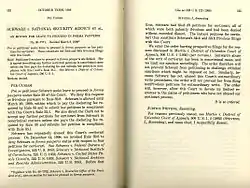SUPREME COURT OF THE UNITED STATES
526 U.S. 122
BARBARA SCHWARZ v NATIONAL SECURITY AGENCY et al.
Nos. 98-7771 and 98-7782. -Decided: March 8, 1999

OPINION:
ON MOTIONS FOR LEAVE TO PROCEED IN FORMA PAUPERIS
PER CURIAM.
Pro se petitioner Schwarz seeks leave to proceed in forma pauperis under Rule 39 of this Court. We deny this request as frivolous pursuant to Rule 39.8. Schwarz is allowed until March 29, 1999, within which to pay the docketing fee required by Rule 38 and to submit her petitions in compliance with this Court's Rule 33.1. We also direct the Clerk not to accept any further petitions for certiorari from Schwarz in noncriminal matters unless she pays the docketing fee required by Rule 38 and submits her petition in compliance with Rule 33.1
Schwarz has repeatedly abused this Court's certiorari process. On December 14, 1998, we invoked Rule 39.8 to deny Schwarz in forma pauperis status with respect to four petitions for certiorari. See Schwarz v. Federal Bureau of Investigation, 525 U.S. 1053 (1998); Schwarz v. National Institute of Corrections, 525 U.S. 1053, 142 L. Ed. 2d 556, 119 S. Ct. 616 (1998); Schwarz v. United States Parole Comm'n, 525 U.S. 1053, 142 L. Ed. 2d 556, 119 S. Ct. 616 (1998); Schwarz v. National Archives and Records Administration, 525 U.S. 1053, 142 L. Ed. 2d 556, 119 S. Ct. 616 (1998). Before that time, Schwarz had filed 29 petitions for certiorari, all of which were both patently frivolous and had been denied without recorded dissent. The instant petitions for certiorari thus constitute Schwarz's 34th and 35th frivolous filings with this Court.
We enter the order barring prospective filings for the reasons discussed in Martin v. District of Columbia Court of Appeals, 506 U.S. 1, 121 L. Ed. 2d 305, 113 S. Ct. 397 (1992) (per curiam). Schwarz's abuse of the writ of certiorari has been in noncriminal cases, and we limit our sanction accordingly. The order therefore will not prevent Schwarz from petitioning to challenge criminal sanctions which might be imposed on her. Similarly, because Schwarz has not abused this Court's extraordinary writs procedures, the order will not prevent her from filing nonfrivolous petitions for extraordinary writs. The order will, however, allow this Court to devote its limited resources to the claims of petitioners who have not abused our certiorari process.
It is so ordered.
MR. JUSTICE STEVENS, Dissenting.
For reasons previously stated, see Martin v. District of Columbia Court of Appeals, 506 U.S. 1, 4, 121 L. Ed. 2d 305, 113 S. Ct. 397 (1992) (STEVENS, J., dissenting), and cases cited, I respectfully dissent.
This work is in the public domain in the United States because it is a work of the United States federal government (see 17 U.S.C. 105).